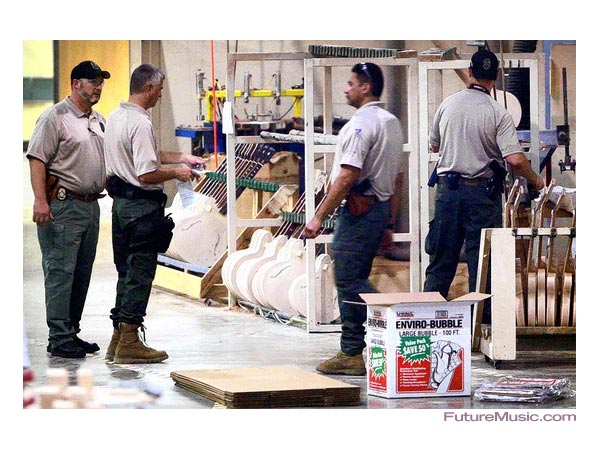Gibson Gets Assistance From Legislators To Stop Fed Raids On Its Factory
Henry Juszkiewicz, who not only has the hardest name to spell in the music industry, but is also CEO of the second largest guitar maker, has enlisted the help of representatives Mary Bono Mack (R-California), Marsha Blackburn (R-Tenn) and Jim Cooper (D-Tenn). The trio introduced a bill last week to protect Gibson and other musical instrument manufacturers from prosecution from unknowingly utilizing protected woods in their creations.

It’s hard to determine whether the bill stems from corporate campaign donations, or the true empathy of the representatives, but the Federal raids on Gibson have been deemed overkill and a poor use of Federal funds by many industry watchers.
Gibson was raided for the second time at the end of the summer when about 20 armed Federal agents stormed his factory in Nashville and removed $3 million dollars worth of raw materials and finished instruments. 6000 pieces of rosewood used for fretboards and 100 finished guitars were “handcuffed” and carted out by the authorities. Vince Gill, Charlie Daniels and Roseanne Cash, all users of Gibson, voiced their support for the famed Les Paul instrument maker.
The irony is that Juszkiewicz has been a strong proponent of using legally obtained exotic woods and was even on the board of the Rainforest Alliance, but had to resign after the first raid on his factory caused negative publicity.
Feds focused their August 24th raid on a shipment of ebony exported from India to Gibson that was “fraudulently” labeled to conceal a contravention of Indian export law. Gene Nix, a product engineer at Gibson, was questioned by agents and seems to be the focus of the second raid based on emails he sent back to Juszkiewicz about acquiring ebony and other exotic products on the “grey market.”
The Future: $3 millon dollars out of a $500 million annual intake is not going to make much of a dent on the productivity of Gibson, but it does cast a negative shadow on the Tennessee concern. Enlisting the help of legislation, to curtail the intrusions on his business, is a savvy move in a country where politicians have no problem following the money to re-election, but the representatives would do the country a better service if they would completely refresh the Lacey Act of 1900, which the Feds utilized to pursue Gibson and was originally passed to regulate trade in bird feathers used for hats and amended in 2008 to cover wood and other plant products, and not just signal out music instrument makers.






